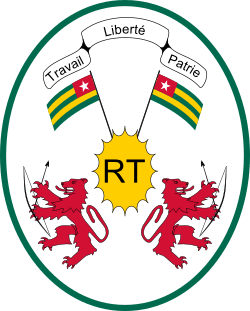2002 Togolese parliamentary election
Parliamentary elections were held in Togo on 27 October 2002. Like the previous elections in 1999, they were boycotted by nine opposition parties (known as the Coalition of Democratic Forces), following the replacement of the Independent National Electoral Commission by a seven-magistrate committee and a revision of the Electoral Code.[1] The result was a victory for the ruling Rally of the Togolese People, which won 72 of the 81 seats. Voter turnout was 67%.
 |
|---|
| This article is part of a series on the politics and government of Togo |
|
Parliament
|
|
Administrative divisions |
|
|
|
Results
| Party | Votes | % | Seats | +/– |
|---|---|---|---|---|
| Rally of the Togolese People | 72 | –7 | ||
| Rally for the Support of Democracy and Development | 3 | New | ||
| Juvento | 2 | New | ||
| Union for Democracy and Social Progress | 2 | New | ||
| Believers' Movement for Equality and Peace | 1 | New | ||
| Independents | 1 | –1 | ||
| Total | 1,915,875 | 100 | 81 | 0 |
| Registered voters/turnout | 2,841,079 | 67.4 | – | – |
| Source: African Elections Database | ||||
gollark: ... what?
gollark: I don't like Nazis or ethnonationalists or whatever, but I *also* don't want people to be physically attacked because of their beliefs.
gollark: I disagree with punching people because of their ideology, personally.
gollark: Anarchoprimitivism is not "based".
gollark: KIND OF?
References
- Togo: Elections held in 2002 Inter-Parliamentary Union
This article is issued from Wikipedia. The text is licensed under Creative Commons - Attribution - Sharealike. Additional terms may apply for the media files.